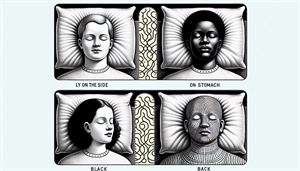Snoring - an orchestra of nighttime that no one applauds for. A common yet often misunderstood phenomenon, snoring is a force that can drive a wedge between the sheets, leaving partners sleep-deprived and irritable.
But what if the symphony of snores is not just an annoying habit, but a sign of something more serious? Let’s unravel the mystery behind the snore and explore “why have I started snoring in my 30s” along with ways to silence it.
Key Takeaways
-
Snoring often begins in the 30s due to factors like lifestyle changes, weight gain, or hormonal fluctuations; it’s not just an annoyance but may signal sleep-disordered breathing, which can lead to more serious health issues.
-
Sleep position significantly affects snoring, with back sleeping aggravating it while side sleeping or sleeping with an elevated head can mitigate it; adjustments like changing sleep positions and using aids are effective remedies.
-
Beyond lifestyle adjustments and natural remedies, diagnosed sleep apnea requires medical intervention, ranging from CPAP therapy to possibly surgical solutions, depending on the severity and response to other treatments.
Snoring in Your 30s: Common Causes

Interestingly, your 30s is a time when snoring often makes its grand debut. You might have sailed through your 20s with quiet nights, but suddenly, the tranquility is shattered by the cacophony of snores as you fall asleep. So, what causes this sudden change?
There are several factors at play. Lifestyle changes, weight gain, and hormonal fluctuations can all contribute to the noisy nuisance of snoring. Understanding that snoring is not just an inconvenience but often a symptom of sleep disordered breathing is crucial. This condition can lead to daytime sleepiness, high blood pressure, and even heart disease.
So, if you or your partner start snoring in your 30s, it’s time to pay attention and seek ways to treat snoring.
Lifestyle Changes
Lifestyle changes, particularly those involving substances like alcohol and cigarettes, can be a major trigger for snoring. Drinking alcohol can cause the throat muscles to relax, leading to a narrower upper airway during sleep and causing snoring vibrations. One can prevent this by ceasing alcohol consumption at least three to four hours before bedtime.
Smoking, on the other hand, can lead to nasal congestion and irritation of the airways, causing snoring. Therefore, abstaining from smoking is key if you wish to maintain a blissful silence during your sleep. So, if you’ve recently started to snore loudly and you are a smoker or frequent alcohol consumer, these lifestyle changes might be the culprits.
Weight Gain

Weight gain is another common cause of snoring, especially if the extra pounds accumulate around your neck. This additional tissue can constrict your airways, leading to the very loud snoring during sleep. Obesity can also impair the muscles involved in breathing, leading to an increased risk of snoring and sleep apnea.
If you’ve recently gained weight and started snoring, there might be a connection. Losing weight can help reduce the extra tissue around your neck, alleviate pressure on the airway, and subsequently, help you regain peaceful, quiet nights.
Hormonal Fluctuations
Hormonal changes, particularly in women, can lead to snoring. Hormones like androgens, progesterone, and estradiol can affect the muscle tone around the airway, leading to narrowed airways and an increased likelihood of snoring.
Pregnancy, which brings about dramatic hormonal changes, and menopause, which leads to a decrease in certain hormones, can both increase the likelihood of snoring in women. Hence, if you’re a woman in your 30s and have started snoring, hormonal fluctuations could be the instigator.
The Impact of Sleep Position on Snoring

Have you ever thought about how your sleeping position could be affecting your snoring? It might seem insignificant but the position you adopt while sleeping can have a significant impact on your snoring. Back sleeping, for instance, is the most problematic and can significantly amplify your snoring.
Changing your sleep position can be one of the easiest and most effective ways to reduce your snoring. We will explore the various sleep positions and their potential to either worsen or mitigate your snoring.
Back Sleeping
If you’re a back sleeper, you might want to consider changing your sleeping habits. Back sleeping often leads to snoring as it can cause:
-
the base of your tongue and soft palate to collapse towards the back of your throat
-
narrowing of your airway
-
vibrations, which are the root cause of snoring.
But don’t worry, there are solutions to help you. Some options to alleviate snoring include:
-
Changing your sleep position
-
Using an anti-snore pillow
-
Wearing nasal strips
-
Focusing on weight loss if necessary
And yes, there are specially designed pillows, like Saatva Latex Pillow or Avocado Green Pillow, that can provide support and alignment for your head and neck to minimize snoring.
Side Sleeping
Side sleeping can be a saving grace for snorers. This position helps keep the airway open, preventing the tongue and jaw from falling back and obstructing the airway, which can lead to snoring.
There are also aids, like specially designed pillows and mattresses, which can help you maintain a side sleeping position throughout the night. So, if you’re a snorer, it might be time to switch sides and embrace the benefits of side sleeping.
Elevated Sleeping
Sleeping with your head elevated is another effective strategy to combat snoring. This position helps prevent the tongue from collapsing backward and obstructing the airway, aiding in better airflow during sleep.
To achieve the perfect elevated sleep position, consider using wedge-shaped pillows or adjustable beds. The recommended elevation for the head is about 12 to 30 degrees. Thus, if altering sleep positions doesn’t provide relief, considering elevated sleeping might be beneficial.
Sleep Apnea and Snoring in Your 30s
When snoring becomes a nightly nuisance, and you or your partner notices interruptions in your breathing during sleep, it’s time to consider that you might be dealing with something more serious than just snoring. Sleep apnea, a serious sleep disorder characterized by pauses in breathing during sleep, can cause snoring and should be addressed promptly.
Sleep apnea can go undiagnosed in many individuals, particularly women, with up to 93% of women with obstructive sleep apnea (OSA) remaining undiagnosed. If regular snoring along with symptoms like:
-
loud snoring
-
breathing interruptions during sleep
-
morning headaches
-
excessive daytime fatigue
become noticeable, it would be wise to consult a healthcare professional.
Identifying Sleep Apnea
Identifying sleep apnea involves recognizing a variety of symptoms. Loud snoring, gasping for air during sleep, and excessive daytime sleepiness are all common symptoms of this sleep disorder.
Being overweight, older age, alcohol consumption, smoking, and sleeping on your back are all considered as risk factors for certain health conditions. These factors may increase the likelihood of developing health issues. If you’re experiencing these symptoms, it’s important to consult with a sleep medicine professional who can conduct a sleep study to determine if you have sleep apnea.
Treatment Options
Upon being diagnosed with sleep apnea, seeking treatment becomes vital to prevent escalating health complications and improve your sleep quality. Continuous positive airway pressure (CPAP) therapy is one common treatment for sleep apnea. This therapy works by delivering pressurized air through a mask and tubing to maintain an open airway during sleep, thereby reducing sleep apnea episodes and the frequency of snoring.
However, like all treatments, CPAP therapy can come with potential side effects like discomfort, skin irritation, and infections. It’s important to work with your healthcare provider to find a treatment plan that works best for you.
Natural Remedies and Lifestyle Changes to Reduce Snoring
If the thought of wearing a mask while sleeping or undergoing a surgical procedure doesn’t appeal to you, there are natural remedies and lifestyle changes that can help you snore less. From dietary adjustments to regular exercise, to stress management, these strategies can help you sleep silently and peacefully.
Remember, while these remedies can be effective, it’s always important to consult with a healthcare professional if your snoring persists or worsens. Next, we will further explore these natural remedies and lifestyle changes.
Dietary Adjustments

Diet plays a significant role in snoring. Heavy meals before bedtime can lead to snoring due to the relaxation of throat and tongue muscles during digestion. Making adjustments to your diet such as avoiding large meals before bedtime, opting for fish over red meat, and limiting alcohol can all be beneficial in reducing snoring.
Certain nutrient-rich foods like turmeric can also help prevent inflammation in your nasal and throat passages, reducing snoring. Thus, if you aspire to silence your snores, considering some dietary modifications might be beneficial.
Exercise and Weight Loss
Regular exercise can do wonders for your snoring. By strengthening the muscles in your throat and mouth, exercise can help improve muscle control and prevent throat muscles relax during sleep, a common cause of snoring.
Mouth and throat exercises, such as oropharyngeal muscle exercises, singing, and myofunctional therapy, can help reduce snoring. Weight loss is also crucial in reducing snoring. Losing just 10-15% of body weight can decrease the severity of obstructive sleep apnea by up to 50%. Hence, it would be beneficial to gear up and work towards losing those excess pounds.
Stress Management
Stress can play a significant role in snoring. Elevated stress levels can result in poor sleep quality, leading to snoring. Managing your stress through relaxation techniques like deep breathing, progressive muscle relaxation, and establishing a consistent sleep schedule can help reduce snoring.
Hence, if stress is overwhelming, taking a moment to breathe deeply and relax would be beneficial. Not only will you feel better, but your bed partner will likely thank you for the quiet nights.
Medical Interventions for Snoring

When natural remedies and lifestyle changes aren’t enough, medical interventions for snoring can come to the rescue. From over-the-counter solutions to prescription medications and surgical procedures, medical interventions offer a range of options to help you stop snoring.
Keep in mind the importance of consulting with a healthcare professional before initiating any treatment plan. Let’s now delve into these medical interventions.
Over-the-Counter Solutions
Over-the-counter solutions can provide temporary relief from snoring. These include mouth guards, nasal strips or dilators, and anti-snoring mouthpieces. Nasal strips, for example, work by widening the nasal passages, enhancing airflow, and reducing snoring.
Throat sprays, another over-the-counter remedy, often contain ingredients like menthol and eucalyptus oil, which can help reduce snoring. Although over-the-counter solutions can be effective, they should be used as instructed and under the guidance of a healthcare provider.
Prescription Medications
Prescription medications like Flonase, Nasonex, and Astelin can also help alleviate snoring, especially when it’s caused by nasal congestion or inflammation. These medications work by constricting and reducing inflammation in the blood vessels and tissues within the nose, relieving congestion, and diminishing snoring.
However, like all medications, these can come with potential side effects. Working with a doctor to comprehend these potential side effects and identify the most suitable medication for you is crucial.
Surgical Procedures
For severe cases of snoring that do not respond to other treatments, surgical procedures may be considered. Uvulopalatopharyngoplasty (UPPP) is a surgical intervention that eliminates excess soft tissue in the throat, expanding the airway, and reducing obstruction.
However, surgery comes with its own set of risks and side effects, and the effectiveness varies among individuals. It’s crucial to understand the risks and benefits by consulting with a healthcare provider before pondering over surgical interventions for snoring.
Summary
Snoring - a common nuisance that disrupts sleep and can potentially be a symptom of serious health issues. From lifestyle changes to medical interventions, there are numerous ways to silence the snore. Whether you’re in your 30s or beyond, it’s essential to understand the causes of snoring and seek appropriate treatment.
So, the next time the symphony of snores disrupts your peaceful slumber, remember, you’re not powerless against the snore. Equip yourself with the right knowledge, make some lifestyle changes, and consult a healthcare provider if necessary. After all, a good night’s sleep is not just a luxury, but a necessity.
Frequently Asked Questions
Is it normal for a 30 year old to snore?
Yes, it is normal for a 30-year-old to snore, as snoring is common for many people, including those who are otherwise healthy. Loud, jarring snoring may indicate sleep apnea, which should be evaluated by a healthcare professional.
Why do people start snoring in their 30s?
People start snoring in their 30s mainly due to the decrease in muscle tone as they age, which causes their airways to constrict, leading to snoring. This can also be exacerbated by alcohol and certain medications that relax muscles and restrict airflow.
What causes loud snoring in females?
Hormonal changes, weight gain, allergies, lifestyle, and underlying medical conditions can cause loud snoring in women. These factors can contribute to increased airway resistance and lead to snoring.
How does sleep position affect snoring?
Sleep position can have a significant impact on snoring, and back sleeping is the most problematic. Changing sleep position may help reduce snoring.
What is sleep apnea and how is it related to snoring?
Sleep apnea is a serious sleep disorder that causes pauses in breathing during sleep, leading to snoring. It is a condition that requires medical attention to prevent complications.


